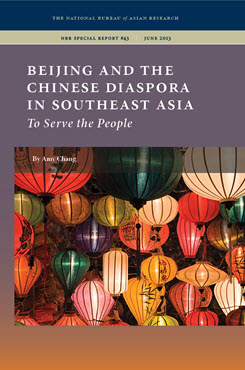NBR Special Report no. 43
Beijing and the Chinese Diaspora in Southeast Asia
To Serve the People
This report examines the contemporary dynamics between the Chinese diaspora in Southeast Asia and the People’s Republic of China (PRC) and draws implications for the role of the Chinese diaspora in China’s foreign policy.
EXECUTIVE SUMMARY
MAIN ARGUMENT
With a diaspora population that has grown to more than 50 million, Beijing has over the last several decades adapted its policies to the expansion of the Chinese diaspora abroad to both appeal to and protect overseas Chinese. Since 1989, China has actively pursued policies to connect culturally and politically with and harness the economic and political benefits of the Chinese diaspora, using tools that include overseas recruitment and incentive programs and government entities that deal specifically with overseas Chinese populations. China also attempts to foster a domestic environment that primes Chinese individuals to represent the country’s interests abroad through commercial, cultural, and political engagement. In addition to highlighting the economic benefits of a relationship with China, Beijing has attempted to exert strategic influence on the Chinese diaspora through soft-power inducements. Despite mixed results, Beijing understands the strategic importance of the diaspora in economic and political affairs and is expected to continue consideration of the diaspora in its foreign-policy planning.
POLICY IMPLICATIONS
- Given the historical animosity and distrust in Southeast Asia toward China, Beijing is concerned with portraying itself in a favorable light in the region and hopes that gaining the approval of Chinese diaspora communities will indirectly and positively influence China’s relations with their host countries.
- While ethnic Chinese worldwide share linguistic and cultural bonds, most ethnic Chinese in Southeast Asia do not possess a bond with China beyond purely economic interests and thus do not want to risk losing political and economic privileges to serve China’s broader interests.
- Beijing’s proclamation of its obligation to protect the Chinese diaspora presents an immense security challenge for the PRC and requires a reconsideration of the principles guiding China’s foreign policy.
- Diaspora populations, which currently exert passive influence on China’s foreign policy by forcing Chinese to consider their growing importance in economic and political affairs, could more actively engage China. The major obstacle is unifying disparate diaspora communities around specific demands.


